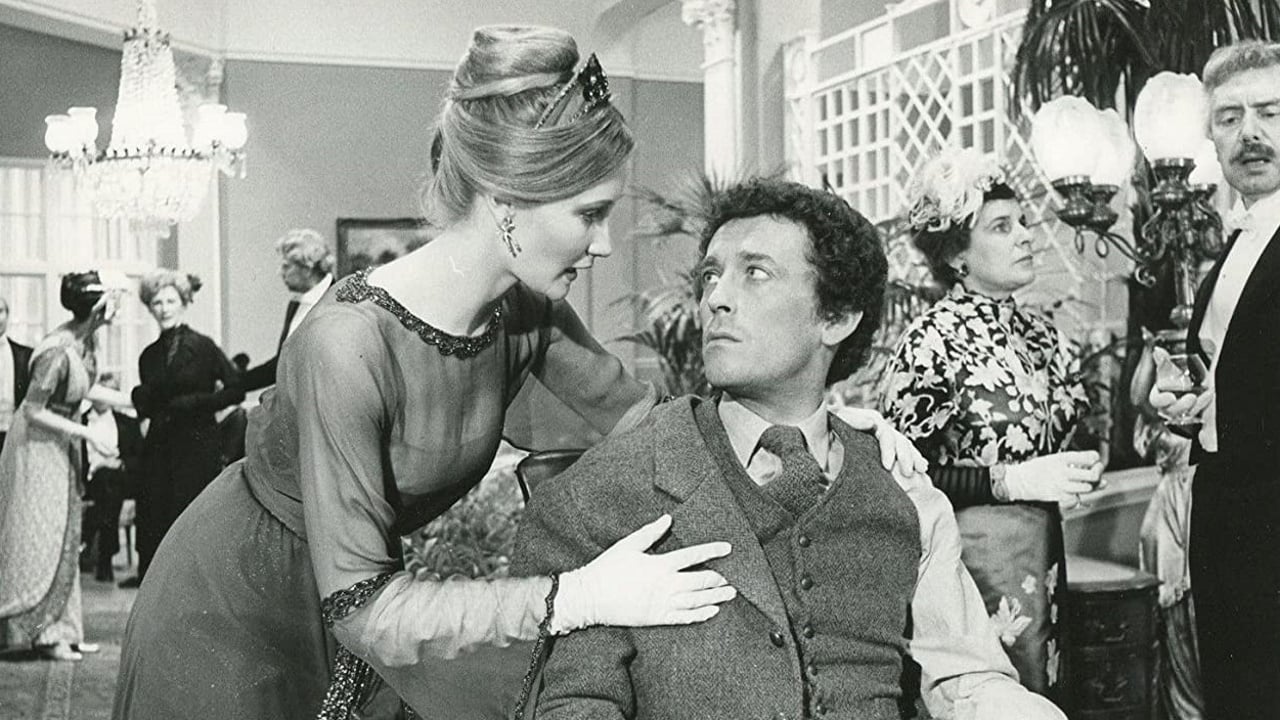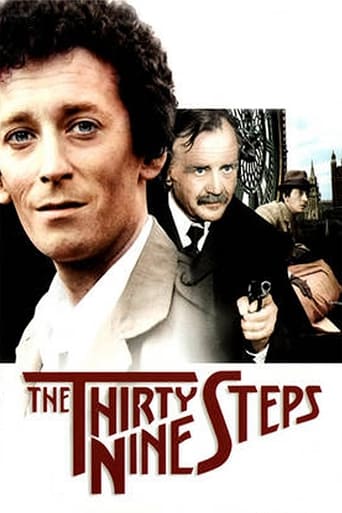

It's quite different from Alfred Hitchcock's 1930s version. The emphasis here is on spying and preventing the assassination of a Greek diplomat in 1914. The Balkans must hold together to give Britain time to prepare for the inevitable war. And it's complicated. Uncovering the villain and the villainous plot is not a simple matter of running into some guy with a bit of his finger missing. The plot is a tangled knot of fake identities and a confusion that results in both the police and the scurrilous assassins chasing Robert Powell (as Hannay) around Scotland and London.I'm not sure any of the versions I've seen follow the novel very closely. It's been years since I've read the book but I do recall that somewhere along the way Hannay had to take a job as a ditch digger. No such vulgar passage here.The novel aside, Hitchcock's version is an improvement over this one in many ways. The incident in which Robert Donat as Hannay spends the night in the home of a stingy, jealous farmer with a sympathetic wife is almost a short movie in itself, both suspenseful and dramatic. "Do ye eat the herring?" Nothing like that here.On the other hand, this is pretty tense on its own. Hannay escapes from a stalled train by climbing under a bridge, only it's not over the Forth of Firth. Nice shots of Hannay as a distant figure on the Scottish hills, running for his life, his long black coat flapping, while two marksmen try to bring him down.And the exciting climax would have suited Hitchcock to a T. A bomb that will destroy the Greek diplomat and the rest of Parliament with him is set to go off at 11:45. Hannay and the police must stop this from happening by defanging the explosive device then clambering out onto the face of Big Ben and wrestling with the mammoth minute hand. Someone falls to his death. Hitch would have loved it but this version is still well enough done to generate a lot of apprehension.
... View More!!No spoilers!! Now, I must confess, I like this film (I've probably just turned away thousands of people just by saying that!) but hear me out! I loved Hitchcock's 39 steps - it's a classic! And it's brilliant. And I love Buchan's book - it's exciting and a classic! I love the play 'The 39 steps' - it's hilarious! The secret is to NOT COMPARE this film to any of the above! Let it stand alone - there must be about 20 spin-offs and interpretations of Buchan's book by now - let this one be! Looking at this film, and this film alone, I would say it's rather good. The acting is very good - especially Robert Powell as the 30s gentlemen, and it's always a great pleasure to see John Mills. All round good acting.Secondly, the scenery is fantastic! Just because it's not in 'Modern, blu-ray super HD!' doesn't mean it's not stunning. It's not about the definition of the scenery- it's about how it's shown, and I think this presentation of the Scottish highlands is beautiful.Don Sharp's (the director's) camera-work may not be as epic as Hitchcock's, but it's a solid style and presents this whole 1930s world beautifully.All I can ask is that you give this film a chance - if you don't like it, fine. But treat it on its own, if you see what I mean - don't go off comparing it to God knows what! I hope you enjoy it. It's a good film.
... View More"The Thirty Nine Steps", the spy novel by John Buchan, has been adapted for the screen three times. The most famous one being the 1935 version by Alfred Hitchcock which still remains an old favorite by most viewers. The 1959 remake directed by Ralph Thomas was a vehicle for its star, Kenneth Moore. We were intrigued when the Don Sharp 1978 film version when it showed up on a classic channel not long ago.Not having read the novel, we cannot, in all honesty, make an objective assessment of how close to the written page the latest remake is, but we were pleasantly surprised by what Mr. Sharp was able to accomplish. The adaptation was written by Michael Robson. The action used a lot of well known backgrounds. The best of these is the one that takes place in the last sequence of the film in which we are taken inside Big Ben where Hannay, having solved the mystery, goes after the Prussian spies.Robert Powell was effective in his characterization of Hannay, the South African engineer that is drawn, against his will, to be at the center of a manhunt for something he never did. The cast was excellent. John Mills, Eric Porter, David Warner, Donald Pickering, Ronald Pickup, and Karen Dotrice, among them. John Coquillon was the cinematographer and the musical score was created by Ed Welch. Don Sharp's entertaining take on this classic is worth a look.
... View MoreIt's hardly fair to compare this to the Hitchcock version (which was made when Buchan was not yet a well-known author). I think the Hitchcock film is the better as a film, although there are a few stodgy moments (with the crofter, for instance), but lots of lovely visual ideas to compensate (the Bridge scene, the missing digit, and the ending). But Hitchcock's is not a filming of Buchan's novel. It's something quite different. The first remake (with Kenneth More) was a remake of the Hitchcock film, not the book. With this version, we were told it would be faithful to the original, but, yes, the ending is stolen from an old Will Hay film (which was very much before its time, with its black humour). So this is not really a remake of the Hitchcock film, but neither is it faithful to Buchan (which I must re-read). But it is enjoyable, the period feel is good, and I personally like Ed Welch's concerto score.
... View More